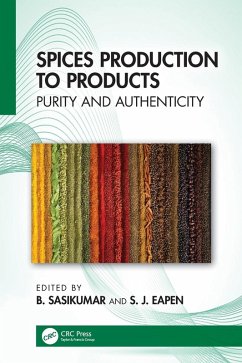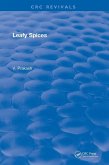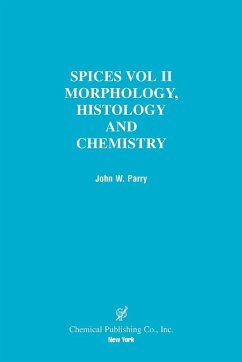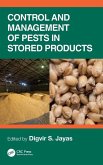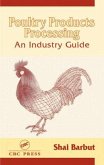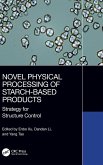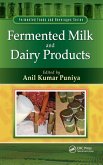Spices Production to Products
Purity and Authenticity
Herausgeber: Sasikumar, B.; Eapen, S. J.
Spices Production to Products
Purity and Authenticity
Herausgeber: Sasikumar, B.; Eapen, S. J.
- Gebundenes Buch
- Merkliste
- Auf die Merkliste
- Bewerten Bewerten
- Teilen
- Produkt teilen
- Produkterinnerung
- Produkterinnerung
Ensuring the purity and authenticity of spices is more critical than ever. Addresses the challenges of spice adulteration and contamination that threaten food safety, public health, forex earnings, and the integrity of global supply chains.
Andere Kunden interessierten sich auch für
![Spices Spices]() V. PrakashSpices116,99 €
V. PrakashSpices116,99 €![Anticancer Spices Anticancer Spices]() Hardeep Singh TuliAnticancer Spices116,99 €
Hardeep Singh TuliAnticancer Spices116,99 €![Spices Spices]() John W. ParrySpices80,99 €
John W. ParrySpices80,99 €![Control and Management of Pests in Stored Products Control and Management of Pests in Stored Products]() Control and Management of Pests in Stored Products264,99 €
Control and Management of Pests in Stored Products264,99 €![Poultry Products Processing Poultry Products Processing]() Shai BarbutPoultry Products Processing201,99 €
Shai BarbutPoultry Products Processing201,99 €![Novel Physical Processing of Starch-Based Products Novel Physical Processing of Starch-Based Products]() Novel Physical Processing of Starch-Based Products217,99 €
Novel Physical Processing of Starch-Based Products217,99 €![Fermented Milk and Dairy Products Fermented Milk and Dairy Products]() Fermented Milk and Dairy Products324,99 €
Fermented Milk and Dairy Products324,99 €-
-
-
Ensuring the purity and authenticity of spices is more critical than ever. Addresses the challenges of spice adulteration and contamination that threaten food safety, public health, forex earnings, and the integrity of global supply chains.
Produktdetails
- Produktdetails
- Verlag: CRC Press
- Seitenzahl: 414
- Erscheinungstermin: 17. Juli 2025
- Englisch
- Abmessung: 260mm x 183mm x 27mm
- Gewicht: 970g
- ISBN-13: 9781032732091
- ISBN-10: 1032732091
- Artikelnr.: 73396927
- Herstellerkennzeichnung
- Libri GmbH
- Europaallee 1
- 36244 Bad Hersfeld
- gpsr@libri.de
- Verlag: CRC Press
- Seitenzahl: 414
- Erscheinungstermin: 17. Juli 2025
- Englisch
- Abmessung: 260mm x 183mm x 27mm
- Gewicht: 970g
- ISBN-13: 9781032732091
- ISBN-10: 1032732091
- Artikelnr.: 73396927
- Herstellerkennzeichnung
- Libri GmbH
- Europaallee 1
- 36244 Bad Hersfeld
- gpsr@libri.de
Dr. B. Sasikumar, who holds a Ph.D. in Plant Breeding from Anand Agricultural University, Gujarat, with post-doctoral training in Plant Molecular Biology from the School of Biotechnology, Madurai Kamaraj University, Tamil Nadu, India, as well as the Plant Biotechnology Institute, NRC-Canada, brings 33 years of experience in spices breeding, genetic resources, and adulteration detection of spices using molecular tools. He retired as Principal Scientist and Head, Crop Improvement and Biotechnology Division at ICAR-Indian Institute of Spices Research, Kozhikode, Kerala, India. Dr. Sasikumar is currently a member of the Scientific Panel on Spices and Culinary Herbs of the Food Safety and Standards Authority of India (FSSAI). A decorated science communicator, he has published 127 research articles, 16 review articles, 16 book chapters, and approximately 400 popular articles on various aspects of spices, including adulteration detection, varieties, genetic resources, and success stories. He is credited with developing 13 acclaimed varieties of spices, most of which have been well received by stakeholders in India. Dr. Sasikumar is internationally recognized as a spice specialist and has been featured in Stanford University's 2023 and 2024 lists of the world's top 2% scientists. He served as Spices Expert in Guyana, South America, for two years and also visited Vietnam and Nepal for spice consultancy and research. Dr. S. J. Eapen, an alumnus of Calicut University, is a leading expert in spice research in India, with a career spanning over three decades. He has held prestigious roles, including Principal Scientist and Head at ICAR-Indian Institute of Spices Research and President of the Indian Society for Spices. In these roles, he led initiatives that elevated both the scientific and industrial standards of the spice sector. His expertise covers research management, crop protection, nematology, and bioinformatics, establishing him as a key figure in developing sustainable agricultural practices for spice cultivation. Throughout his distinguished career, Dr. Eapen has authored numerous research papers, reviews, and book chapters. As a passionate writer, he regularly blogs about science and technology, including the integration of AI in scientific research. His work includes the development of disease-resistant spice varieties, and he holds patents for biocontrol formulations that advance environmentally sustainable pest management strategies in agriculture. Dr. Eapen's international influence extends beyond India. He has served as a nematology consultant in Vietnam and chaired scientific committees in Malaysia, contributing to the global exchange of knowledge in his field. Currently, he serves as a member of the FSSAI Scientific Panel on Pesticide Residues, shaping national policies on pesticide residues and ensuring their alignment with international standards. As Advisor to the World Spice Organisation, he collaborates closely with the global spice industry, and as a mentor for the Kerala Startup Mission, he guides young entrepreneurs and fosters innovation in the spice and agricultural sectors. His contributions continue to shape the future of spice research and industry both in India and internationally.
1. Historical Perspectives on Adulteration and Contamination of Spices. 2.
Introduction to Spice Adulteration and Authenticity Testing. 3. Global
Standards and Regulations of Spice Purity. 4. Adulteration and Authenticity
Testing in Black Pepper. 5. Adulteration and Authenticity Testing of
Chilli. 6. Adulteration and Authenticity Testing of Nutmeg. 7. Saffron
(Crocus sativus L.) Analysis: Techniques for Quality Assurance and
Authentication. 8. Advances in Adulteration and Authenticity Testing of
ginger (Zingiber officinale Roscoe). 9. Advances in Adulteration and
Authenticity Testing of Turmeric (Curcuma longa L.). 10. Mycotoxin
Contamination in Black Pepper. 11. Mycotoxin Contamination in Cardamom
(Elettaria cardamomum (L.) Maton). 12. Mycotoxin Contamination in Ginger
(Zingiber officinale Rosc.) and Turmeric (Curcuma longa L.). 13.
Contaminants in Nutmeg (Myristica fragrans Houtt.) 14. Mycotoxin
Contamination in Seed Spices. 15. Heavy Metal Contamination in Spices:
Sources, Safety Regulations and Health Implications. 16. Pesticide
Contamination in Black Pepper (Piper nigrum L.): Detection, Implications,
and Sustainable Solutions. 17. Pesticide Residues in Chilli (Capsicum
annuum L.) - An Indian Perspective. 18. Multi-residue Pesticides in Ginger
(Zingiber officinale Roscoe) and Turmeric (Curcuma longa L.): Method of
Analysis and Strategy for Residue Management. 19. Multi-Residue Pesticides
in Seed Spices: Rationale for Analysis and Management Strategies. 20.
Consumer Awareness and Market Demands in Global Spice Value Chains. 21.
Sustainability and Ethical Sourcing of Spices.
Introduction to Spice Adulteration and Authenticity Testing. 3. Global
Standards and Regulations of Spice Purity. 4. Adulteration and Authenticity
Testing in Black Pepper. 5. Adulteration and Authenticity Testing of
Chilli. 6. Adulteration and Authenticity Testing of Nutmeg. 7. Saffron
(Crocus sativus L.) Analysis: Techniques for Quality Assurance and
Authentication. 8. Advances in Adulteration and Authenticity Testing of
ginger (Zingiber officinale Roscoe). 9. Advances in Adulteration and
Authenticity Testing of Turmeric (Curcuma longa L.). 10. Mycotoxin
Contamination in Black Pepper. 11. Mycotoxin Contamination in Cardamom
(Elettaria cardamomum (L.) Maton). 12. Mycotoxin Contamination in Ginger
(Zingiber officinale Rosc.) and Turmeric (Curcuma longa L.). 13.
Contaminants in Nutmeg (Myristica fragrans Houtt.) 14. Mycotoxin
Contamination in Seed Spices. 15. Heavy Metal Contamination in Spices:
Sources, Safety Regulations and Health Implications. 16. Pesticide
Contamination in Black Pepper (Piper nigrum L.): Detection, Implications,
and Sustainable Solutions. 17. Pesticide Residues in Chilli (Capsicum
annuum L.) - An Indian Perspective. 18. Multi-residue Pesticides in Ginger
(Zingiber officinale Roscoe) and Turmeric (Curcuma longa L.): Method of
Analysis and Strategy for Residue Management. 19. Multi-Residue Pesticides
in Seed Spices: Rationale for Analysis and Management Strategies. 20.
Consumer Awareness and Market Demands in Global Spice Value Chains. 21.
Sustainability and Ethical Sourcing of Spices.
1. Historical Perspectives on Adulteration and Contamination of Spices. 2.
Introduction to Spice Adulteration and Authenticity Testing. 3. Global
Standards and Regulations of Spice Purity. 4. Adulteration and Authenticity
Testing in Black Pepper. 5. Adulteration and Authenticity Testing of
Chilli. 6. Adulteration and Authenticity Testing of Nutmeg. 7. Saffron
(Crocus sativus L.) Analysis: Techniques for Quality Assurance and
Authentication. 8. Advances in Adulteration and Authenticity Testing of
ginger (Zingiber officinale Roscoe). 9. Advances in Adulteration and
Authenticity Testing of Turmeric (Curcuma longa L.). 10. Mycotoxin
Contamination in Black Pepper. 11. Mycotoxin Contamination in Cardamom
(Elettaria cardamomum (L.) Maton). 12. Mycotoxin Contamination in Ginger
(Zingiber officinale Rosc.) and Turmeric (Curcuma longa L.). 13.
Contaminants in Nutmeg (Myristica fragrans Houtt.) 14. Mycotoxin
Contamination in Seed Spices. 15. Heavy Metal Contamination in Spices:
Sources, Safety Regulations and Health Implications. 16. Pesticide
Contamination in Black Pepper (Piper nigrum L.): Detection, Implications,
and Sustainable Solutions. 17. Pesticide Residues in Chilli (Capsicum
annuum L.) - An Indian Perspective. 18. Multi-residue Pesticides in Ginger
(Zingiber officinale Roscoe) and Turmeric (Curcuma longa L.): Method of
Analysis and Strategy for Residue Management. 19. Multi-Residue Pesticides
in Seed Spices: Rationale for Analysis and Management Strategies. 20.
Consumer Awareness and Market Demands in Global Spice Value Chains. 21.
Sustainability and Ethical Sourcing of Spices.
Introduction to Spice Adulteration and Authenticity Testing. 3. Global
Standards and Regulations of Spice Purity. 4. Adulteration and Authenticity
Testing in Black Pepper. 5. Adulteration and Authenticity Testing of
Chilli. 6. Adulteration and Authenticity Testing of Nutmeg. 7. Saffron
(Crocus sativus L.) Analysis: Techniques for Quality Assurance and
Authentication. 8. Advances in Adulteration and Authenticity Testing of
ginger (Zingiber officinale Roscoe). 9. Advances in Adulteration and
Authenticity Testing of Turmeric (Curcuma longa L.). 10. Mycotoxin
Contamination in Black Pepper. 11. Mycotoxin Contamination in Cardamom
(Elettaria cardamomum (L.) Maton). 12. Mycotoxin Contamination in Ginger
(Zingiber officinale Rosc.) and Turmeric (Curcuma longa L.). 13.
Contaminants in Nutmeg (Myristica fragrans Houtt.) 14. Mycotoxin
Contamination in Seed Spices. 15. Heavy Metal Contamination in Spices:
Sources, Safety Regulations and Health Implications. 16. Pesticide
Contamination in Black Pepper (Piper nigrum L.): Detection, Implications,
and Sustainable Solutions. 17. Pesticide Residues in Chilli (Capsicum
annuum L.) - An Indian Perspective. 18. Multi-residue Pesticides in Ginger
(Zingiber officinale Roscoe) and Turmeric (Curcuma longa L.): Method of
Analysis and Strategy for Residue Management. 19. Multi-Residue Pesticides
in Seed Spices: Rationale for Analysis and Management Strategies. 20.
Consumer Awareness and Market Demands in Global Spice Value Chains. 21.
Sustainability and Ethical Sourcing of Spices.

